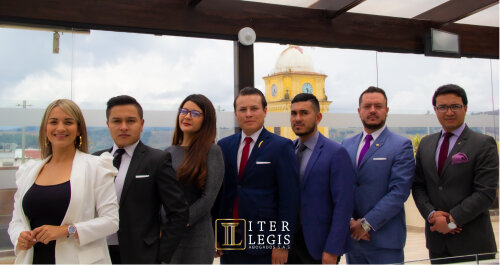Best Nonprofit & Charitable Organizations Lawyers in Tunja
Share your needs with us, get contacted by law firms.
Free. Takes 2 min.
List of the best lawyers in Tunja, Colombia
About Nonprofit & Charitable Organizations Law in Tunja, Colombia
Nonprofit and charitable organizations play a significant role in the social and economic dynamics of Tunja, Colombia. These entities are established to pursue purposes other than generating profits, such as promoting education, culture, health, environmental protection, or social welfare. In Colombia, legal frameworks regulate how nonprofits are created, governed, and operated to ensure their activities align with their missions and comply with the law. In Tunja, local authorities work alongside national entities to oversee these organizations, ensuring transparency and proper management of funds. Understanding the legal landscape is crucial for anyone seeking to form, manage, or support a nonprofit in Tunja.
Why You May Need a Lawyer
Seeking legal counsel is advisable at several stages of establishing and operating a nonprofit or charitable organization. A lawyer can help you:
- Draft and review bylaws and incorporation documents
- Navigate the registration and licensing process with the appropriate authorities
- Advise on tax-exempt status, compliance, and reporting obligations
- Assist with board governance, internal disputes, and risk management
- Interpret and implement changes in relevant laws or policies
- Respond to audits, investigations, or inquiries from authorities
- Prepare and vet contracts with employees, volunteers, and third parties
- Support fundraising, grant compliance, and donor agreements
Legal assistance ensures your organization operates legally and achieves its intended social impact.
Local Laws Overview
Nonprofit and charitable organizations in Tunja are primarily regulated by Colombian national law, such as the Civil Code and Law 22 of 1987, with oversight from local bodies. Key legal aspects include:
- Legal Personality: To operate formally, a nonprofit must be incorporated and recognized as a "Persona Jurídica" by local chambers of commerce or the mayor’s office.
- Governing Documents: Organizations must have clear bylaws defining their objectives, governance structure, and decision-making processes.
- Registration and Supervision: After incorporation, nonprofits are monitored by local authorities, such as the Alcaldía de Tunja and the Chamber of Commerce.
- Tax Exemptions: Entities fulfilling legal requirements can apply for tax-exempt status, subject to strict rules on purpose and operations.
- Reporting Obligations: Regular submission of financial statements and activity reports is required to maintain legal standing.
- Employment Laws: Nonprofits must comply with labor regulations for paid staff and volunteers.
- Transparency and Accountability: Regulations require clear recordkeeping, especially regarding the use of funds and donations.
Local rules may also exist, so it is important to check with authorities in Tunja for specific requirements.
Frequently Asked Questions
What types of nonprofit organizations can be created in Tunja?
Common types include foundations, associations, and corporations for nonprofit purposes. Each type has specific requirements and structures as defined by Colombian law.
How do I legally register a nonprofit in Tunja?
Start by drafting bylaws and articles of incorporation, then submit them to the local Chamber of Commerce or Alcaldía. Upon approval, you will receive legal recognition and a NIT (Tax Identification Number).
Does my organization need to pay taxes?
Nonprofits are generally eligible for tax exemptions, but these are not automatic. Your organization must apply and meet the legal criteria, including transparency in finances and alignment with public benefit purposes.
Are there rules about how funds and donations are managed?
Yes. Laws require transparent bookkeeping, proper allocation of resources, and reporting to both donors and authorities to ensure accountability.
Can foreign organizations operate in Tunja?
Foreign nonprofits can establish a presence but must comply with Colombian registration, reporting, and operational requirements specific to international entities.
What are the responsibilities of board members in a nonprofit?
Board members must act in good faith, uphold the organization’s mission, meet regularly, oversee operations, and ensure legal compliance.
Can a nonprofit hire paid staff?
Yes, nonprofits may employ staff and must comply with Colombian labor laws, including employment contracts, social security, and other worker protections.
How often must a nonprofit file reports?
Nonprofits must submit annual financial statements and may have other periodic reporting obligations, depending on their activities and funding sources.
What happens if a nonprofit violates the law?
Violations can result in fines, loss of tax-exempt status, or even dissolution. Directors or representatives may be held personally responsible in some cases.
How can our organization maintain compliance as laws change?
Staying updated by consulting a lawyer, attending training, and following guidance from local authorities can help you comply with evolving legal requirements.
Additional Resources
For more information or assistance, consider reaching out to:
- Chamber of Commerce of Tunja (Cámara de Comercio de Tunja) - registration and legal personality
- Alcaldía de Tunja - local oversight and support
- DIAN (Dirección de Impuestos y Aduanas Nacionales) - tax exemption applications
- Colombian Confederation of NGOs (Confederación Colombiana de ONGs)
- Legal aid centers at local universities
- Law firms specializing in nonprofit law
Next Steps
If you are considering starting, joining, or supporting a nonprofit or charitable organization in Tunja, Colombia, here’s what you should do:
- Define your organization’s mission, beneficiaries, and activities
- Consult with a legal professional familiar with nonprofit law in Colombia and Tunja
- Prepare required legal documents, such as bylaws and incorporation articles
- Register your entity with the appropriate local authorities
- Apply for tax exemptions, if eligible
- Implement accounting procedures and governance structures for compliance
- Stay informed about any legal or regulatory changes impacting your organization
Early legal advice can save time, prevent costly mistakes, and ensure your nonprofit thrives while serving your community.
Lawzana helps you find the best lawyers and law firms in Tunja through a curated and pre-screened list of qualified legal professionals. Our platform offers rankings and detailed profiles of attorneys and law firms, allowing you to compare based on practice areas, including Nonprofit & Charitable Organizations, experience, and client feedback.
Each profile includes a description of the firm's areas of practice, client reviews, team members and partners, year of establishment, spoken languages, office locations, contact information, social media presence, and any published articles or resources. Most firms on our platform speak English and are experienced in both local and international legal matters.
Get a quote from top-rated law firms in Tunja, Colombia — quickly, securely, and without unnecessary hassle.
Disclaimer:
The information provided on this page is for general informational purposes only and does not constitute legal advice. While we strive to ensure the accuracy and relevance of the content, legal information may change over time, and interpretations of the law can vary. You should always consult with a qualified legal professional for advice specific to your situation.
We disclaim all liability for actions taken or not taken based on the content of this page. If you believe any information is incorrect or outdated, please contact us, and we will review and update it where appropriate.









